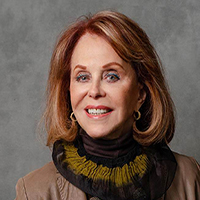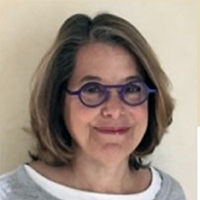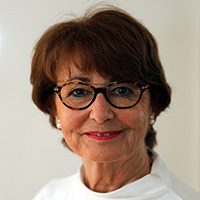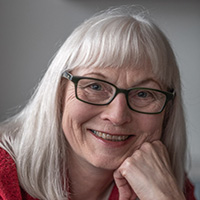IPA Webinar: Death and Illness in the Psychoanalytical Process
The psychoanalytic process is a long journey where there are few certainties. Among the possibilities are the death and illness of some of the participants. The analyst and the patient may suffer an unscheduled end to the clinical process. This webinar will seek to reflect on some aspects of such episodes.
 Moderator: Brenda Solomon (USA)
Moderator: Brenda Solomon (USA)
Brenda Solomon, MD, is a Training and Supervising Analyst at Chicago Psychoanalytic Institute. She taught the required Ethics and Psychoanalysis Course for analytic candidates for many years and currently focuses on the complex problems of the impaired and dying analyst. Dr. Solomon’s research interests have been psychoanalytic education, including teaching analytic principles via Zoom in China and Iran and artificial reproductive techniques’ analytic impact on women and children. Areas of particular interest to her are women’s Issues and Ethics.
Speakers:
 Audrey Kavka (USA)
Audrey Kavka (USA)
M.D. She is a supervisory and faculty member of the San Francisco Center for Psychoanalysis. She has been working in the fields of aging and professional ethics for over 40 years. She is the author of the American Psychoanalytic Association (APsaA) sponsored book, Psychoanalyst Assistance Casebook.
She is a past Chair of the IPA Committee Psychoanalytic Perspectives on the Aging of Patients and Psychoanalysts and Chairs the APsaA Study Group on Aging and Psychoanalytic Education.
Title: Darkness and Light: Shades of Death in the Analytic Process - Read paper
When life threatening illness enters the scene of an ongoing analytic treatment, questions arise. The most sought after are often the most unanswerable. Will I die? When will I die? How will I die? What comes after the death of my body? Seeking care, protection and hope, intense focus is placed on the trusted or not so-trusted external objects chosen to treat them in their illness, including the analyst. Mature and primitive anxieties emerge and cast dark shadows in which it can be difficult to think or see. The analyst is neither omniscient or omnipotent, but the work of an ongoing analytic process brings shades of light in the capacity to keep focus on the role of the inner objects in experiencing what is frightening and unknowable.
 Gabriele Junkers (Germany)
Gabriele Junkers (Germany)
Gabriele Junkers (Ph.D.) is a training analyst of the DPV. She has published in psychoanalysis, gerontology and institutional matters, e.g. 'The Empty Couch' in 2013 and 'Living and Containing Psychoanalysis in Institutions' in 2022 (both Routledge), worked for the EPF Executive, as Editor of EPF Bulletin, as Honorary Secretary, as chair of the ‘Committee of training’ and founded the ‘EPF Forum on Ageing’ and the ‘IPA committee on Ageing of Patients and analysts’.
Title: Ending? - Read paper
We analysts seem to have a problem with endings. Ending is closely related to reality, to separation, and to finality. Facing the passage of time in relation to ourselves, facing our own process of ageing, implies that we have to face finality and irretrievability. I will briefly touch on the reluctance felt by analysts towards working with elderly patients and analysands, their discomfort and sense of shame in talking about this and, more generally, about the human lifecycle. I will mainly focus on the multifaceted issue of preparing for an ending of professional analytic work and the related turning of a blind eye towards generativity, especially in the institutional context.
 Tove Træsdal (Norway)
Tove Træsdal (Norway)
She now retired, worked for several years in a psychiatric hospital treating young adults with severe psychiatric illness, before she established a private practice in 1990. She specialized in treating traumatized mothers with small children. She was a training and supervising analyst at The Institute for Psychotherapy, Oslo, Norway. Træsdal has had a parallel career as a classical singer, giving solo recitals and occasionally joining the chorus of the Norwegian Opera, Oslo.
Title: The psychoanalyst dies – an existential challenge - Download paper
In this short presentation of a very multi-faceted issue, I shall address possible preventive measures that can be taken in any analytic situation to alleviate the impact of a sudden rupture of the analytic process. I will then primarily focus on the potential stumbling blocks to be avoided when a clinician is faced with the task of helping a patient to deal with the loss of an analyst. I will discuss technical aspects and try to shed some light on possible pitfalls inherent in this unfortunate situation on the part of the colleague who is called upon to help the patient to recover from the loss and bring the interrupted analytic process to a growth-promoting closure.
References:
Kavka, A. (2017) "Psychoanalyst Assistance Casebook of the American Psychoanalytic Association", American Psychoanalytic Association
Junkers, G. (2013) “The empty couch”, Routledge
Junkers, G. (2023) “Living and containing Psychoanalysis in institutions. Psychoanalysts working together”, Routledge
Solomon, B.(2019) Conundrums and ComplexitiesTreating the Dying Analyst. Psychoanalysis Self and and Context, 14:195-204
Solomon, B. (2021) Letting Go: An Analyst Voluntarily Retires in Psychoanalysis, Self and Context vol 16. no. 2, 180-187
Traesdal, T. (2005). When the analyst dies: Dealing with the aftermath. Journal of the American Psychoanalytic Association, 53;1235-1255
Traesdal, T. Analysis lost and regained. In: Ed. G. Junkers: The Empty Couch, Routledge 2013, pp.82-90